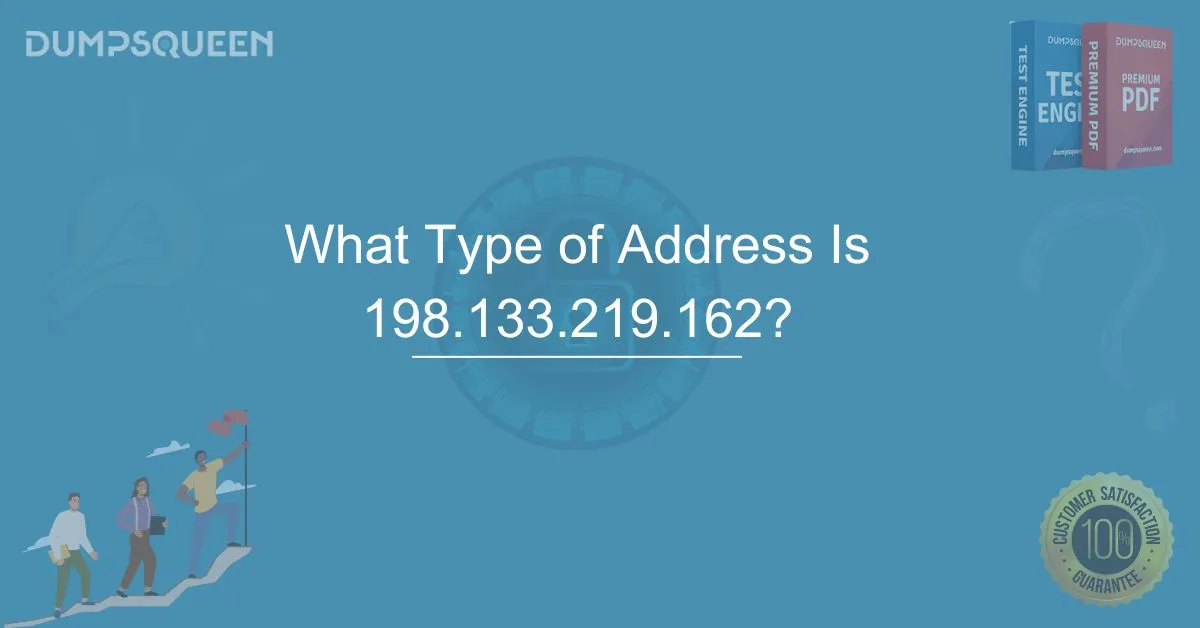Introduction
In the world of networking, IP addresses play a crucial role in identifying devices and facilitating communication over the internet. One such IP address, 198.133.219.162, raises a common question: what type of address is it? Understanding the classification and functionality of this IP address is essential for network administrators, IT professionals, and enthusiasts. In this article, DumpsQueen Official will explore the nature of this address, its significance, and how it fits into the broader scope of networking.
Understanding IPv4 Addressing
The address 198.133.219.162 belongs to the IPv4 (Internet Protocol version 4) addressing scheme. IPv4 is the most widely used protocol for assigning addresses to devices on a network. These addresses consist of four octets, separated by periods, and are expressed in dotted decimal notation. Each octet represents 8 bits, making the total length of an IPv4 address 32 bits.
Classification of IP Addresses
IPv4 addresses are categorized into five major classes: Class A, Class B, Class C, Class D, and Class E. Each class serves a specific purpose and defines the range of addresses assigned to networks.
-
Class A (1.0.0.0 to 126.255.255.255): Designed for large networks with a limited number of networks but a high number of hosts.
-
Class B (128.0.0.0 to 191.255.255.255): Used for medium-sized networks with a balanced number of networks and hosts.
-
Class C (192.0.0.0 to 223.255.255.255): Allocated for smaller networks with a larger number of network addresses but fewer hosts per network.
-
Class D (224.0.0.0 to 239.255.255.255): Reserved for multicasting purposes.
-
Class E (240.0.0.0 to 255.255.255.255): Reserved for experimental use.
The IP address 198.133.219.162 falls within the range of Class C addresses, indicating that it is intended for smaller networks.
Public vs. Private IP Addressing
IPv4 addresses are further divided into public and private addresses. Public IP addresses are routable on the internet, meaning they can be accessed globally. Private IP addresses, on the other hand, are reserved for internal networks and cannot be directly accessed from the internet.
The 198.133.219.162 IP address is a public address, meaning it is assigned by an Internet Service Provider (ISP) and can be used for internet communication. This contrasts with private IP address ranges such as:
-
10.0.0.0 – 10.255.255.255
-
172.16.0.0 – 172.31.255.255
-
192.168.0.0 – 192.168.255.255
Because 198.133.219.162 does not fall within any of these private ranges, it is a public IPv4 address.
The Role of Subnetting
Subnetting is an essential concept in IP networking, allowing large networks to be divided into smaller, more manageable sub-networks. Each IPv4 address is associated with a subnet mask, which determines the network and host portions of the address.
A typical Class C subnet mask is 255.255.255.0, which means the first three octets represent the network portion, while the last octet represents the host portion. This allows for 254 usable hosts within the network.
For the address 198.133.219.162, subnetting could be applied to segment networks for efficiency, security, and management.
Importance of IP Address 198.133.219.162
The address 198.133.219.162 is significant for several reasons:
-
Public Accessibility – Being a public IP address, it is accessible over the internet, making it usable for hosting services, websites, or corporate networks.
-
Class C Allocation – It is structured for smaller networks, which is common among businesses and service providers.
-
Internet Communication – It allows devices to interact over the internet without requiring Network Address Translation (NAT) like private addresses.
Security Considerations for Public IP Addresses
Public IP addresses like 198.133.219.162 are more vulnerable to security threats because they are exposed to external networks. To protect networks using public IP addresses, the following security measures should be implemented:
-
Firewalls: Restrict unauthorized access by setting rules for incoming and outgoing traffic.
-
VPNs (Virtual Private Networks): Encrypt communication to enhance privacy and security.
-
Regular Software Updates: Keep software and hardware updated to patch security vulnerabilities.
-
Intrusion Detection Systems (IDS): Monitor and detect any suspicious activities on the network.
IPv4 Limitations and the Transition to IPv6
IPv4 addresses, including 198.133.219.162, face a significant limitation: the exhaustion of available addresses. Due to the increasing number of devices requiring IP addresses, IPv6 (Internet Protocol version 6) was introduced as a solution.
IPv6 uses a 128-bit address format, allowing for an almost unlimited number of unique addresses. Unlike IPv4, IPv6 addresses are written in hexadecimal notation and separated by colons.
Despite the transition to IPv6, IPv4 remains widely used, and public addresses like 198.133.219.162 continue to be essential for internet communication.
Conclusion
In summary, the IP address 198.133.219.162 is a public, Class C IPv4 address used for internet communication. Its classification and characteristics make it suitable for small to medium-sized networks. As the internet continues to evolve, understanding IPv4 addressing remains critical for networking professionals. With the eventual shift to IPv6, knowledge of both protocols is essential for future-proofing network infrastructure. DumpsQueen Official remains committed to providing high-quality content to enhance your networking expertise.
Free Sample Questions
-
What type of IP address is 198.133.219.162?
A) Private Class A
B) Public Class C
C) Private Class B
D) Public Class A
Answer: B) Public Class C
-
Which subnet mask is typically associated with a Class C address like 198.133.219.162?
A) 255.0.0.0
B) 255.255.0.0
C) 255.255.255.0
D) 255.255.255.255
Answer: C) 255.255.255.0
-
What differentiates a public IP address from a private IP address?
A) Public IP addresses can only be used in internal networks.
B) Private IP addresses are accessible from anywhere on the internet.
C) Public IP addresses are routable over the internet, while private ones are not.
D) Public and private IP addresses function in the same way.
Answer: C) Public IP addresses are routable over the internet, while private ones are not.




